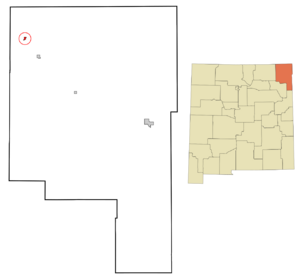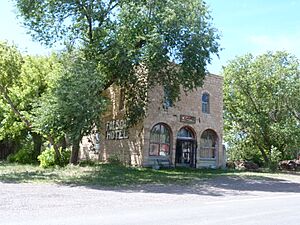Folsom, New Mexico facts for kids
Quick facts for kids
Folsom, New Mexico
|
|
|---|---|
|
Village
|
|

Location of Folsom, New Mexico
|
|
| Country | United States |
| State | New Mexico |
| County | Union |
| Area | |
| • Total | 0.65 sq mi (1.69 km2) |
| • Land | 0.65 sq mi (1.69 km2) |
| • Water | 0.00 sq mi (0.00 km2) |
| Elevation | 6,401 ft (1,951 m) |
| Population
(2020)
|
|
| • Total | 51 |
| • Density | 78.34/sq mi (30.23/km2) |
| Time zone | UTC-7 (Mountain (MST)) |
| • Summer (DST) | UTC-6 (MDT) |
| ZIP code |
88419
|
| Area code(s) | 575 |
| FIPS code | 35-26780 |
| GNIS feature ID | 2413552 |
Folsom is a small village located in Union County, New Mexico, in the United States. In 2020, about 51 people lived there. The village got its name from Frances Folsom, who was going to marry President Grover Cleveland.
Contents
Exploring Folsom's Past
Folsom is famous for giving its name to an important archaeological discovery. This discovery is known as the Folsom Tradition. It tells us about a very old culture of people called Paleo-Indians. These people lived here between 11,000 and 8,000 BC.
The Folsom Site Discovery
About 8 miles west of the village, there's a place called the Folsom site. In 1926, scientists dug here and found something amazing. They found a place where 23 bison had been killed. These ancient hunters used special tools called Folsom points. It was like a hunting camp next to a marsh.
Early Settlements and Railroad Days
Before Folsom, the area was a hunting ground for Native American tribes like the Comanche, Ute, and Jicarilla Apache. The first European settlement nearby was Madison, started in 1864 by Madison Emery. A post office opened there in 1877.
However, Madison became a ghost town in 1888. This happened when the Colorado and Southern Railroad built its tracks. Folsom was then built right on the new railroad line.
Train Robberies and a Famous Outlaw
The train passing near Folsom was robbed three times by a famous outlaw named Black Jack Ketchum and his group. The last robbery happened in 1899. This led to Ketchum's capture and later, his hanging.
Growth and Challenges in Folsom
In its early years, Folsom grew quickly. It had some of the biggest stockyards (places where livestock are kept) west of Fort Worth, Texas. Many homesteaders (people who settled on land) moved in and tried to farm. At its busiest, Folsom had almost 1,000 people.
However, farming was tough because of droughts. Large ranches soon took over from the smaller farms. The town faced a huge disaster on August 27, 1908. A massive rainstorm caused a terrible flood that almost destroyed the town. Sadly, 18 people lost their lives. This same flood also uncovered the ancient bison bones that George McJunkin found. These bones later became part of the famous Folsom site discovery.
Education and Community Life
Folsom briefly had a high school, but only three students graduated in 1931. In 1966, the elementary school closed. Students then started going to school in Des Moines, New Mexico, about 8 miles away. Folsom still has its own post office today.
Many people call Folsom a "ghost town" now because it has very few active businesses. Most of the community life happens around the Folsom Museum. This museum opened in 1966 in the old Doherty Mercantile building. It has a large collection of local items and hosts several events each year. The museum is open every day between Memorial Day and Labor Day.
Understanding Folsom's Geography
Folsom is located in a wide valley. It's near where the Cimarron River begins. This part of the river is sometimes called the Dry Cimarron because it flows underground for some of its path in eastern New Mexico.
Natural Surroundings of Folsom
The village is surrounded by tall, flat-topped hills called buttes and mesas. There are also old volcanoes and lava flows nearby. Most of the valley has rich grasslands. You can find pinyon pine and juniper trees on slopes and in rocky areas. Taller ponderosa pines grow in canyons and at higher elevations.
Large ranches and cattle grazing are common in this area. Some farming with irrigation happens downstream from Folsom. Hunting for animals like deer, bear, elk, pronghorn, and turkey is popular on local ranches.
Nearby Natural Attractions
Capulin Volcano National Monument is about 7 miles (11 km) south of Folsom. This volcano rises to 8,182 feet (2,494 meters) above sea level, making it the highest point near Folsom.
Folsom Falls is about 3 miles northeast of the town, along New Mexico State Highway 456. The Cimarron River here is a small stream, only a few feet wide, and it's stocked with trout every year for fishing.
About 8 miles (13 km) west of the village, below Johnson Mesa, is Wild Horse Arroyo. This is where, in 1908, a cowboy named George McJunkin found the bones of an extinct bison. This amazing discovery later proved that ancient people had lived in the Americas for at least 10,000 years, much longer than people had thought before.
Folsom's Climate and Weather
Folsom's high elevation helps keep summer temperatures mild. July is the warmest month, with an average high of 84°F (28°C) and an average low of 56°F (13°C). January is the coldest month, with an average high of 45°F (7°C) and an average low of 17°F (-8°C).
The highest temperature ever recorded was 99°F (37°C), and the lowest was -28°F (-33°C). Folsom gets about 18 inches (46 cm) of rain each year, mostly in the summer. It also gets about 30 inches (76 cm) of snow annually. July and August are the wettest months, while January and February are the driest.
Understanding Folsom's Population
| Historical population | |||
|---|---|---|---|
| Census | Pop. | %± | |
| 1910 | 484 | — | |
| 1940 | 360 | — | |
| 1950 | 206 | −42.8% | |
| 1960 | 142 | −31.1% | |
| 1970 | 75 | −47.2% | |
| 1980 | 73 | −2.7% | |
| 1990 | 71 | −2.7% | |
| 2000 | 75 | 5.6% | |
| 2010 | 56 | −25.3% | |
| 2020 | 51 | −8.9% | |
| U.S. Decennial Census | |||
In 2000, there were 75 people living in Folsom. These people made up 31 households and 19 families. The village had about 139 people per square mile.
Who Lives in Folsom?
In 2000, about 73% of the people were White, and about 21% were from other races. About 35% of the population identified as Hispanic or Latino.
Of the households, about 35% had children under 18 living with them. Almost half (48%) were married couples. About 35% of all households were single individuals, and some of these were people aged 65 or older living alone. The average household had 2.42 people, and the average family had 3.15 people.
Age and Income in Folsom
In 2000, about 29% of the people in Folsom were under 18 years old. About 35% were between 25 and 44 years old. The median age (the middle age) was 40 years.
The median income for a household in the village was $17,083 per year. For a family, it was $25,750. The average income per person in the village was $9,561. About 35% of the population lived below the poverty line. This included more than half of those under 18.
Notable People from Folsom
- Sally J. Rooke (1840–1908): She was a telephone operator. During the 1908 flood, she stayed at her switchboard to warn others about the danger and sadly died. The State of New Mexico recognized her as a Heroine of New Mexico. There is a monument in her honor next to the Folsom Museum.
- George McJunkin (1856-1922): Born into slavery, George McJunkin taught himself many subjects, including English, Spanish, astronomy, geology, and history. He worked as a ranch hand in Folsom. He made a very important discovery of prehistoric animal remains. His knowledge helped interest museums in investigating the site. In 1926, the ancient culture found there was named after the town of Folsom. Sadly, he passed away before his discovery was fully recognized.
See also
 In Spanish: Folsom (Nuevo México) para niños
In Spanish: Folsom (Nuevo México) para niños
 | Charles R. Drew |
 | Benjamin Banneker |
 | Jane C. Wright |
 | Roger Arliner Young |



